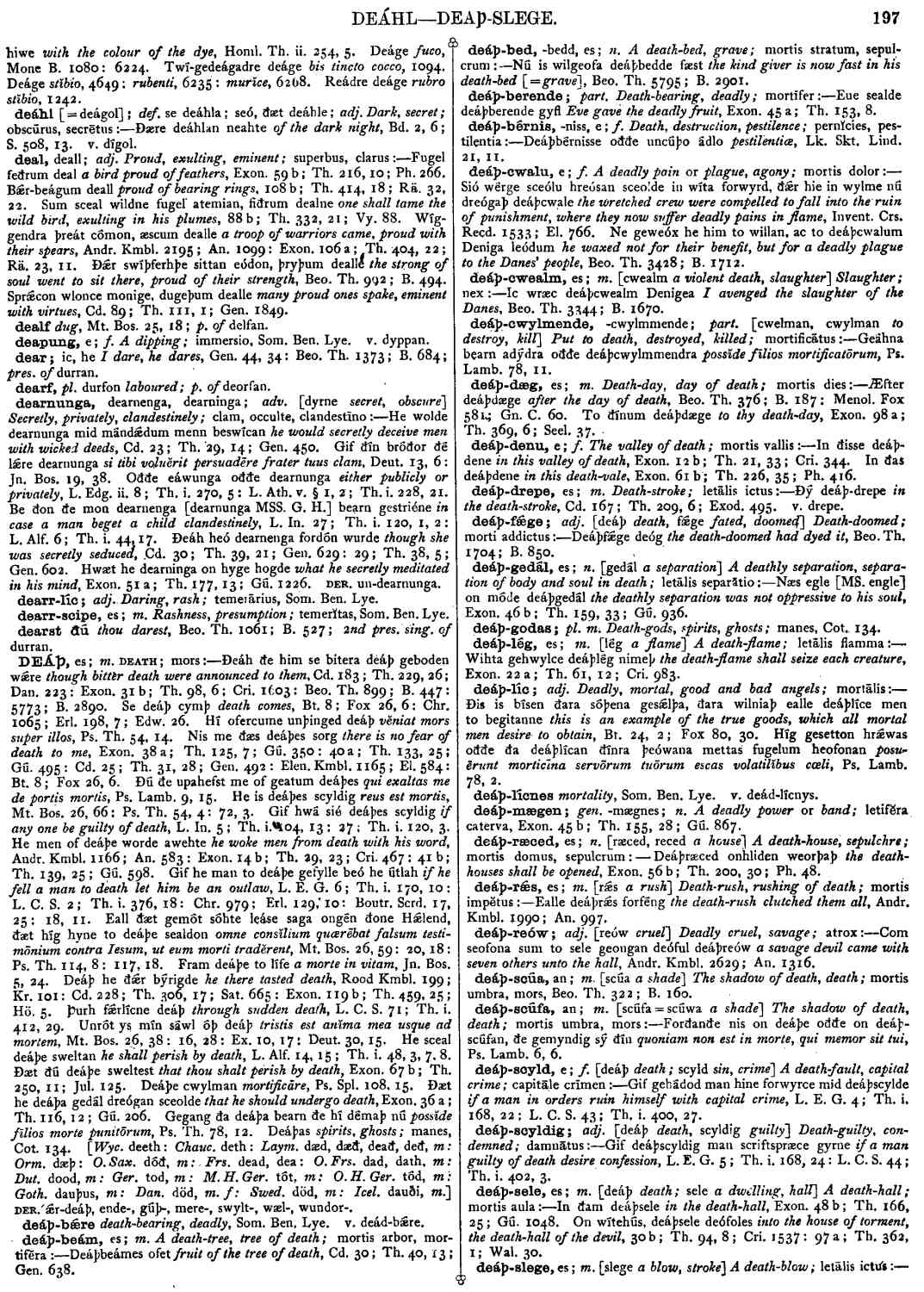DEÁÞ
- noun [ masculine ]
-
Ðeáh ðe him se bitera deáþ geboden wǽre
though bitter death were announced to them,
- Cd. 183 ;
- Th. 229, 26;
- Dan. 223: Exon. 31 b ;
- Th. 98, 6;
- Cri. 1603: Beo. Th. 899 ;
- B. 447: 5773 ;
- B. 2890 .
-
Se deáþ cymþ
death comes,
- Bt. 8 ;
- Fox 26, 6: Chr. 1065 ;
- Erl. 198, 7;
- Edw. 26 .
-
Hí ofercume unþinged deáþ
vĕniat mors super illos,
- Ps. Th. 54, 14.
-
Nis me ðæs deáþes sorg
there is no fear of death to me,
- Exon. 38 a ;
- Th. 125, 7;
- Gú. 350: 40 a; Th. 133, 25;
- Gú. 495: Cd. 25 ;
- Th. 31, 28;
- Gen. 492: Elen. Kmbl. 1165 ;
- El. 584: Bt. 8 ;
- Fox 26, 6.
-
Ðú ðe upahefst me of geatum deáþes
qui exaltas me de portis mortis,
- Ps. Lamb. 9, 15.
-
He is deáþes scyldig
reus est mortis,
- Mt. Bos. 26, 66: Ps. Th. 54, 4: 72, 3.
-
Gif hwá sié deáþes scyldig
if any one be guilty of death,
- L. In. 5 ;
- Th. i. 104, 13;
- 27 ;
- Th. i. 120, 3.
-
He men of deáþe worde awehte
he woke men from death with his word,
- Andr. Kmbl. 1166 ;
- An. 583: Exon. 14 b ;
- Th. 29, 23;
- Cri. 467: 41 b ;
- Th. 139, 25;
- Gú. 598 .
-
Gif he man to deáþe gefylle beó he útlah
if he fell a man to death let him be an outlaw,
- L. E. G. 6 ;
- Th. i. 170, 10: L. C. S. 2 ;
- Th. i. 376, 18: Chr. 979 ;
- Erl. 129, 10: Boutr. Scrd. 17, 25: 18, 11 .
-
Eall ðæt gemót sóhte leáse saga ongén ðone Hǽlend, ðæt híg hyne to deáþe sealdon
omne consĭlium quærēbat falsum testimōnium contra Iesum, ut eum morti tradĕrent,
- Mt. Bos. 26, 59: 20, 18: Ps. Th. 114, 8: 117, 18.
-
Fram deáþe to lífe
a morte in vitam,
- Jn. Bos. 5, 24.
-
Deáþ he ðǽr býrigde
he there tasted death,
Rood- Kmbl. 199 ;
- Kr. 101: Cd. 228 ;
- Th. 306, 17;
- Sat. 665: Exon. 119 b ;
- Th. 459, 25;
- Hö, 5 .
-
Þurh fǽrlícne deáþ
through sudden death,
- L. C. S. 71 ;
- Th. i. 412, 29.
-
Unrót ys mín sáwl óþ deáþ
tristis est anĭma mea usque ad mortem,
- Mt. Bos. 26, 38: 16, 28: Ex. 10, 17: Deut. 30, 15.
-
He sceal deáþe sweltan
he shall perish by death,
- L. Alf. 14, 15;
- Th. i. 48, 3, 7, 8.
-
Ðæt ðú deáþe sweltest
that thou shalt perish by death,
- Exon. 67 b ;
- Th. 250, 11;
- Jul. 125 .
-
Deáþe cwylman
mortificāre,
- Ps. Spl. 108, 15.
-
Ðæt he deáþa gedál dreógan sceolde
that he should undergo death,
- Exon. 36 a ;
- Th. 116, 12;
- Gú. 206 .
-
Gegang ða deáþa bearn ðe hí démaþ nú
possĭde fīlios morte punitōrum,
- Ps. Th. 78, 12.
-
Deáþas
spirits, ghosts;
manes,- Cot. 134 .
Bosworth, Joseph. “DEÁÞ.” In An Anglo-Saxon Dictionary Online, edited by Thomas Northcote Toller, Christ Sean, and Ondřej Tichy. Prague: Faculty of Arts, Charles University, 2014. https://bosworthtoller.com/7471.
Checked: 1